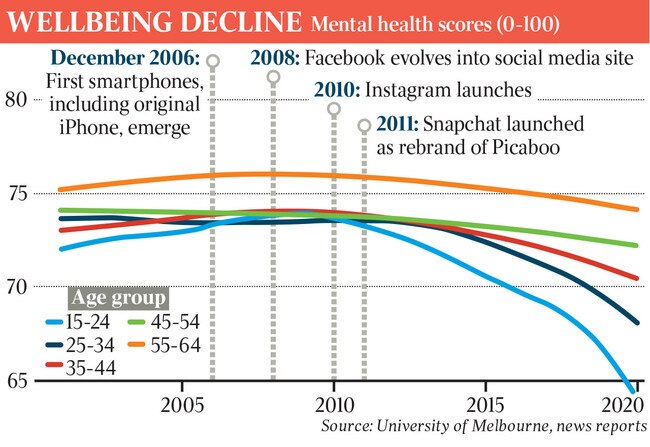Millennials bearing mental health brunt
If you were born before 1980, it is likely your mental health has barely changed in the last two decades. But for those born after 1990 it’s a very different story

The mental health of today’s teens and twenty-somethings is far worse than those of the same age a generation ago, and is set to stay poor as they age.
New research definitively shows the worsening mental health of millennials is driving the nation’s overall increase in mental ill-health, with little evidence it is declining for those born prior to 1980.
The Melbourne University study concludes that a rapid society-wide decline in mental health over the past two decades was not due to any particular event experienced by all ages, nor as a consequence of changes in wellbeing levels as people age.
Rather, it is primarily driven by the plummeting mental health of those born since 1990, an issue set to continue to afflict this same group as they move into their 30s, 40s and 50s, the report finds.

The report, The Kids Are Not Alright: Differential trends in mental ill-health in Australia, reports mental and behavioural disorders in Australia increasing from 9.6 per cent of those aged 15 and over in 2001 to 21.4 per cent in 2020-21.
Using in-depth data over 20 years from the Household, Income and Labour Dynamics in Australia survey, it concludes those born after 1990 “show the strongest trajectories of worsening mental health over time”.
“Individuals in this cohort report worse mental health than earlier cohorts at the same ages (and) we expect this decline in the most recent generations will continue as they age,” the report says. “These recent trends are unlikely to spontaneously resolve without addressing the new or exaggerated risks that may be differentially affecting these recent cohorts.”
While the report doesn’t try to get behind why younger Australians are faring worse, lead author and Melbourne Institute research fellow Ferdi Botha offered several potential explanations.
“There is a theory that some of this might be because younger people are more willing to acknowledge struggles with wellbeing than older cohorts,” Dr Botha said.

“But I suspect the bigger effect might be from the various effects of social media.
“This is the most obvious environmental difference between the current generation of … and their predecessors.”
Other possible stressors on young people that may not have been as prevalent on previous generations are precarious employment, greater financial strain, experiences of cyber bullying, and social isolation.
Beyond Blue chief executive Georgie Harman said the findings “provide yet more support for the need for mental health system reform and the need to do things differently”.
“We know half of all mental health issues begin before the age of 14 and three-quarters by 25,” Ms Harman said.
“If we want to prevent, or at least reduce, the severity and impact of mental health issues, greater investment in prevention and early intervention is vital.”
The Melbourne Institute report coincides with new research from the office of the eSafety Commissioner finding about one in three adults said negative online experiences impacted their emotional and mental wellbeing.




To join the conversation, please log in. Don't have an account? Register
Join the conversation, you are commenting as Logout